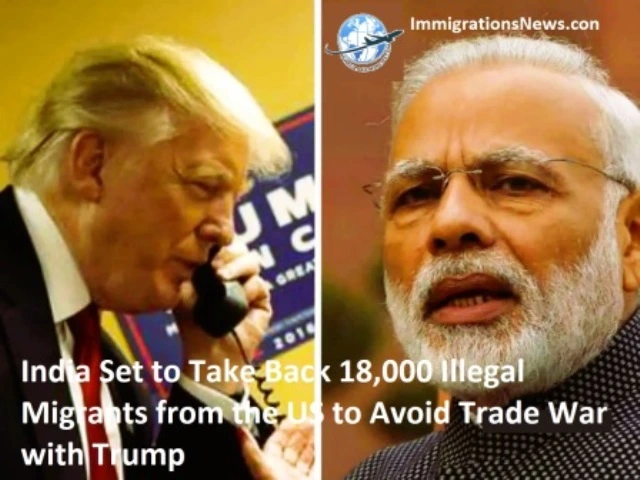India’s government is ready to take immediate action to repatriate approximately 18,000 of its citizens residing illegally in the United States. This move comes as part of India’s strategic effort to align with the Trump administration’s immigration policies and prevent the looming threat of a trade war. In this article, we delve into the details of India’s response to U.S. immigration demands, the implications for both nations and the broader consequences on global migration patterns.
India’s Commitment to Repatriate Illegal Migrants
India is working closely with the Trump administration to identify and repatriate illegal Indian migrants in the U.S. The figure of 18,000 illegal migrants was confirmed by sources familiar with the negotiations, although the total number may be higher.
India’s cooperation on this issue signals the government’s intent to avoid trade sanctions and maintain favorable diplomatic relations with the U.S. In return, India hopes to safeguard its citizens’ ability to legally enter the U.S., particularly through student visas and the H-1B program for skilled workers.
Why is India Complying with Trump’s Demands?
India’s decision to cooperate with the U.S. administration stems from the desire to avoid trade retaliation. President Trump’s administration has been vocal about cracking down on illegal immigration, and India’s commitment aims to prevent any economic fallout from these policies.
Moreover, India views this cooperation as an opportunity to strengthen its relationship with the U.S., especially concerning legal immigration pathways. Indian workers, particularly in the tech industry, have benefitted significantly from the H-1B visa program, which accounts for nearly 75% of all H-1B visas issued in 2023.
Impact on US-India Relations and Global Migration Trends
India’s proactive approach to tackling illegal migration to the U.S. may not only influence its bilateral relations with America but also have global implications. By cooperating with the U.S., India aims to maintain its labor agreements with other countries, such as Taiwan, Japan, and Saudi Arabia. These agreements are crucial for addressing domestic job shortages and ensuring economic growth.
Illegal Migration Numbers: India’s Contribution
While India accounts for only about 3% of all unlawful U.S. border crossings, the number of illegal Indian migrants has risen in recent years. According to data from U.S. Customs and Border Protection, Indian nationals make up almost a quarter of all illegal crossings at the less-trafficked northern U.S. border.
A 2022 report from the Department of Homeland Security estimated that there were approximately 220,000 unauthorized Indian immigrants in the U.S. This has led India to explore more ways of controlling migration flows, including repatriation agreements and stricter visa policies.
| Migration Statistics | India’s Share | Other Nations’ Share |
|---|---|---|
| Illegal Border Crossings | 3% | 97% |
| H-1B Visas Issued in 2023 | 75% | 25% |
Cooperation with U.S. Border Enforcement
India’s cooperation with U.S. border enforcement is not a new development. As early as October 2023, India facilitated a large-scale repatriation flight, bringing over 100 illegal Indian nationals back home. This is part of a broader effort to support U.S. immigration policies while protecting its own citizens’ right to migrate legally.
India’s Ministry of External Affairs has emphasized that the cooperation aims to deter illegal migration and promote legal migration pathways, benefiting both nations.
India’s Strategy: Avoiding a Trade War
In addition to its immigration stance, India is keen to avoid a trade conflict with the U.S., especially given Trump’s harsh rhetoric on high import taxes. India has already faced tariffs from the U.S. in recent years, and the country’s government is keen to resolve trade issues without escalating tensions.
Possible Trade Retaliation from the U.S.
If India were to resist repatriating its illegal nationals, it could provoke economic retaliation from the Trump administration. The U.S. president has frequently criticized countries, including India, for what he views as unfair trade practices. India’s decision to repatriate migrants is, therefore, a calculated move to avoid such a scenario and ensure continued economic cooperation between the two countries.
Looking Ahead: The Future of US-India Migration and Trade Relations
As the global political landscape continues to evolve, India’s ability to manage illegal migration while preserving its relationship with the U.S. will be critical. The repatriation of 18,000 illegal migrants is just the beginning of India’s broader strategy to balance domestic economic growth, international relations, and migration policies.
With the stakes high, both countries must continue to engage in dialogue to ensure that legal migration pathways remain open while addressing the concerns related to illegal migration. The outcome of these efforts will shape the future of US-India relations for years to come.
India’s move to repatriate 18,000 illegal migrants from the U.S. highlights the evolving dynamics of international immigration policy. By cooperating with the Trump administration, India seeks to avoid economic retaliation and protect its legal immigration pathways. As both countries navigate this complex issue, the global implications of their actions will likely be far-reaching.



